Apple Cider Vinegar for Protein Overload (The Quick Fix)
Updated on
This post may contain affiliate links. As an Amazon Associate, we may earn from qualifying purchases.
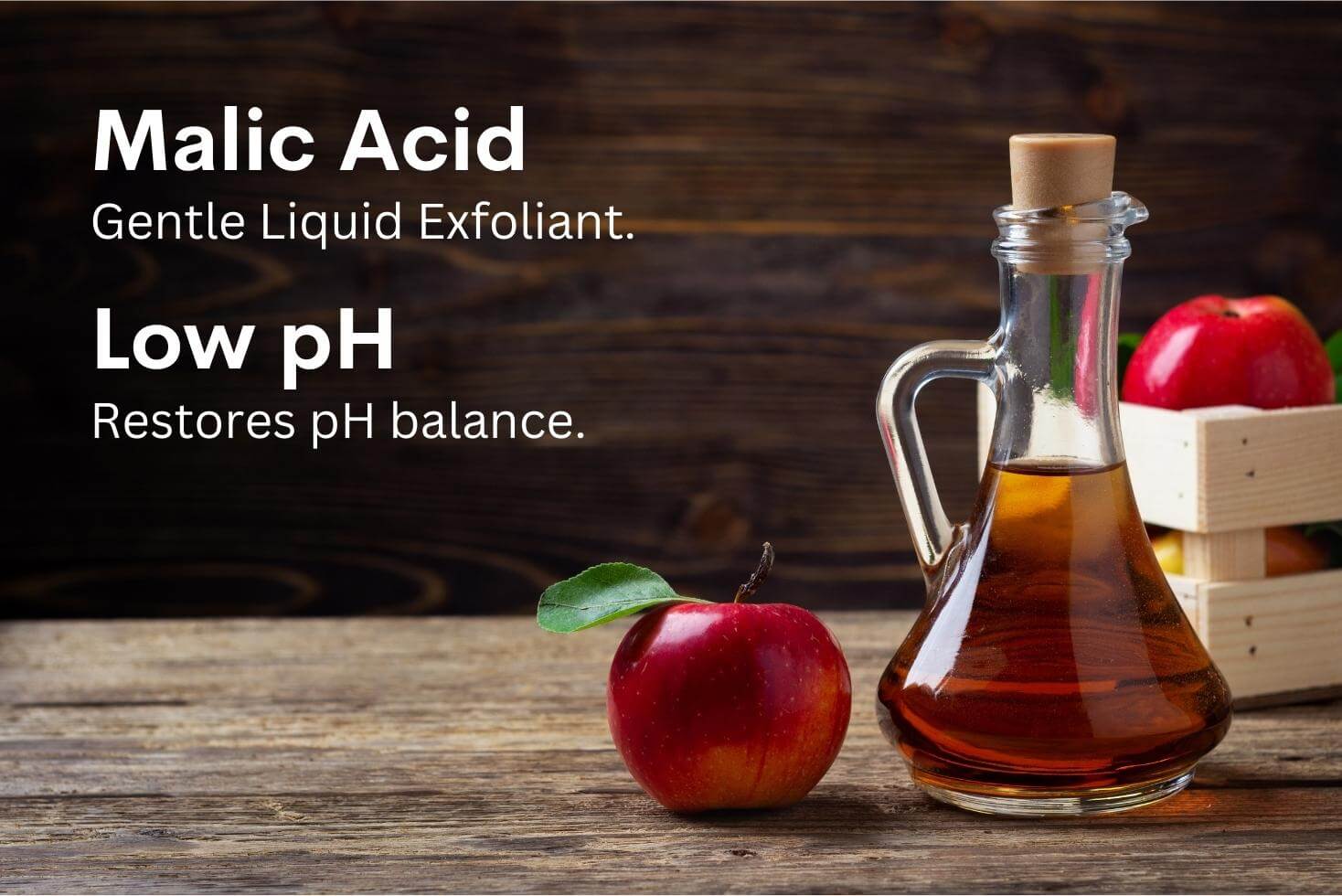
Protein and moisture in the hair are like yin and yang.
Both essential for the hair, they work in harmony in a cycle of perpetual balance.
If the balance is not right:
- Too much moisture makes the hair limp and stringy.
- Too much protein makes the hair dry, brittle, and stiff (No elasticity).
While limp and stringy hair isn’t so much of a big deal (other than styling issues), protein overload can snap your hair off like twigs.
The telltale signs of excess protein in the hair are usually:
- itchy, flaky, and dry scalp,
- greasiness,
- stiff and straw-like hair that is not easy to style,
- a zillion knots and tangles,
- hair breakage, and
- split ends.
Yeah, I know. Pretty daunting to deal with!
If you feel that your hair is going in that direction, you’re probably using too many protein-heavy products in your routine – like deep conditioning masques, creams, or damage repair treatments, that may be doing more harm than good.
Now, I am not saying you should throw them away ASAP.
Protein is a necessary and beneficial component for hair. But it needs to be balanced out with moisture. Otherwise, your hair will feel like dry spaghetti. It won’t stretch, but it will snap easily.
This is where the good ol’ apple cider vinegar swoops in to restore equilibrium with its gentle exfoliating acids and supercharged moisture.
WOW Apple Cider Vinegar Shampoo and Conditioner
Table of Contents
- Apple Cider Vinegar Is a Gentle Liquid Exfoliant
- ACV Breaks Down Protein
- Apple Cider Vinegar Helps the Hair Absorb and Retain Moisture
- ACV Rebalances the pH of Hair and Scalp
- Best Apple Cider Vinegar to Use
- How to Use ACV as a Hair Rinse
- How to Use Apple Cider Vinegar to Treat Protein Overload
- How Long Will It Take for ACV to Fix Protein Overload?
- If You Don’t Like DIY, Get a Formulated Product
- How to Avoid Protein Overload in the Future
- tl;dr
Here are 3 reasons why apple cider vinegar works as an effective treatment for protein overload:
- It gently exfoliates.
- Apple cider vinegar contains malic acid, a type of alpha hydroxy acid(AHA) that works as a gentle liquid exfoliator [1]. Primarily used in skincare products for its ability to cleanse pores, slough off dead skin cells, and brighten the complexion, it breaks down cohesive bonds of dead cells (buildup).
- It moisturizes.
- Malid acid is a humectant. It attracts and retains moisture. It helps balance the excess protein with enough moisture to restore optimal health.
- It rebalances hair pH.
- Apple cider vinegar has a pH range of 2-3 [2], which makes it acidic. Healthy scalp and hair should have a pH range of 3.5 – 5.5, which is slightly acidic. Apple cider vinegar’s acidic properties neutralize alkalinity in the hair to restore balance. Good balance also leads to healthier hair.
Apple Cider Vinegar Is a Gentle Liquid Exfoliant
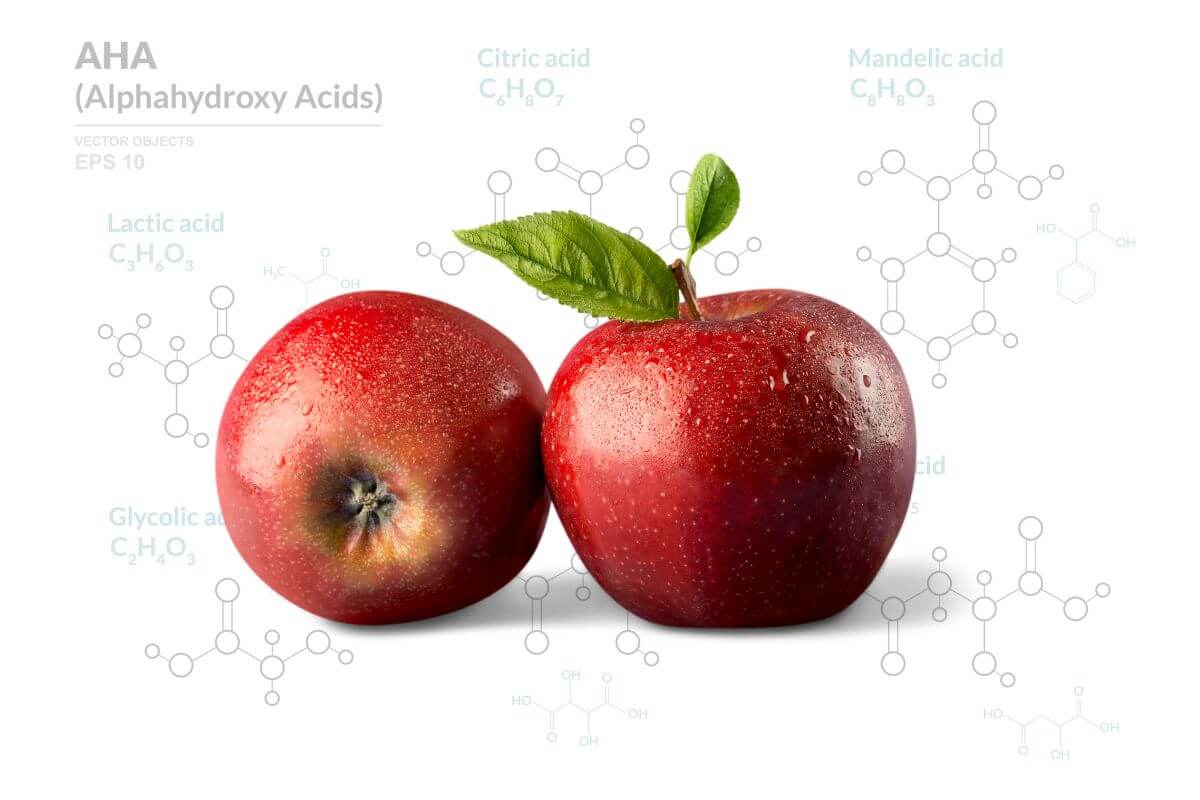
Protein overload creates buildup in the hair and sometimes on the scalp, making it harder for products to permeate the cuticle layer and reach the skin. As a result, the hair and scalp starve for essential nutrients, leaving them dehydrated and desperate.
The alpha hydroxy acids in ACV work by gently scrubbing off the excess protein (keratin) on the hair to unclog the cuticles and dissolve away their flaky byproducts.
By doing so, the acids cut through the “glue,” the adhesive protein fibers that harden and stick to the hair’s surface.
Interestingly, in a study conducted on the treatment of epidermolytic hyperkeratosis (a skin keratinization disorder), AHA proved to have beneficial effects in improving cosmetic appearance and reducing symptoms in patients who underwent clinical trials. [3]
ACV Breaks Down Protein
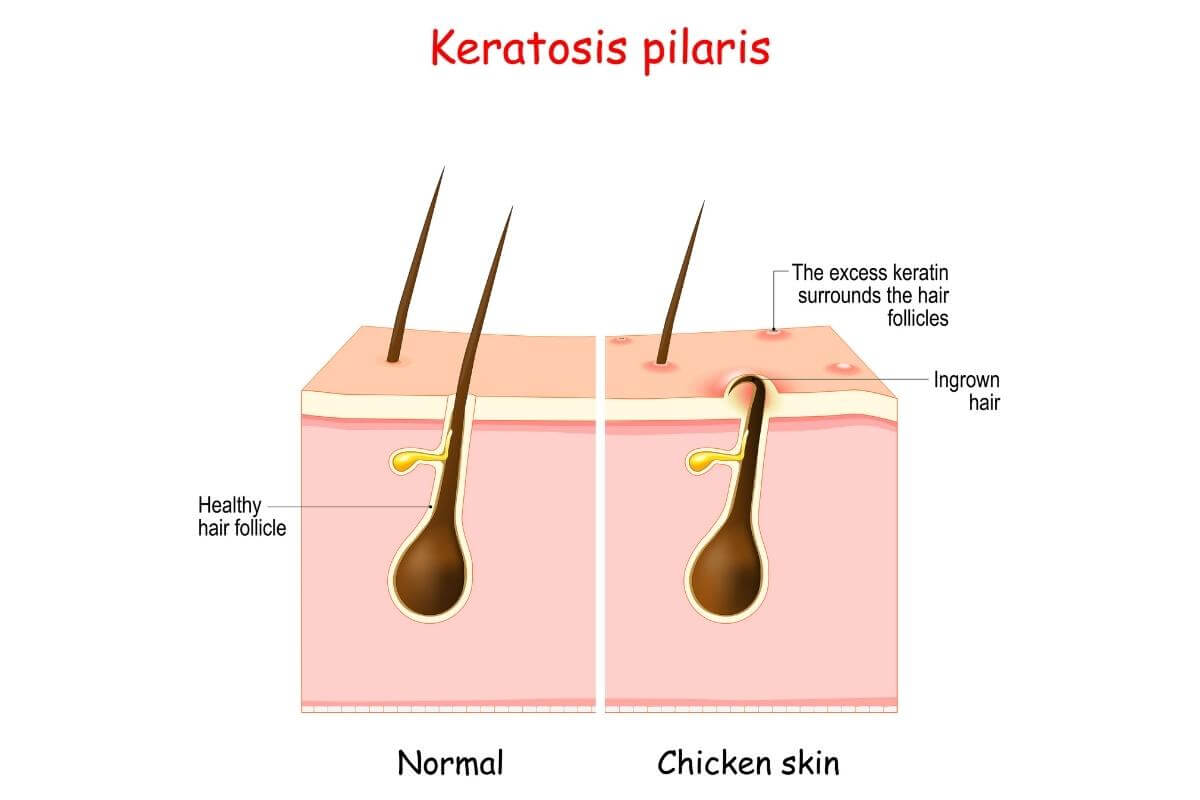
The key to treating protein overload is to break it down into smaller, lighter particles that can be dissolved and rinsed.
Again, alpha hydroxy acids have proven to banish protein buildup when treating a similar condition known as keratosis pilaris. [4]
Keratosis pilaris happens when hair follicles become blocked with a build-up of keratin, the type of protein that makes the hair, skin, and nails. The condition is characterized by hardened, white, or yellowish plugs on the hair follicles due to an overproduction of keratin.
According to Blair Murphy-Rose, MD, FAAD, a clinical Dermatologist in New York, gentle exfoliating acids like AHAs are the best options for treating such conditions.
Joshua Zeichner, MD, another New York City-based board-certified Dermatologist, adds: “AHAs can help improve flakes and reduce oil on the scalp, which translates to less greasy hair and improved flaking and even dandruff.”
Thanks to its high acidic content, apple cider vinegar is one of the most efficient natural remedies for this process. It’ll break down the stale protein buildup on your scalp and leave it clean.
Apple Cider Vinegar Helps the Hair Absorb and Retain Moisture
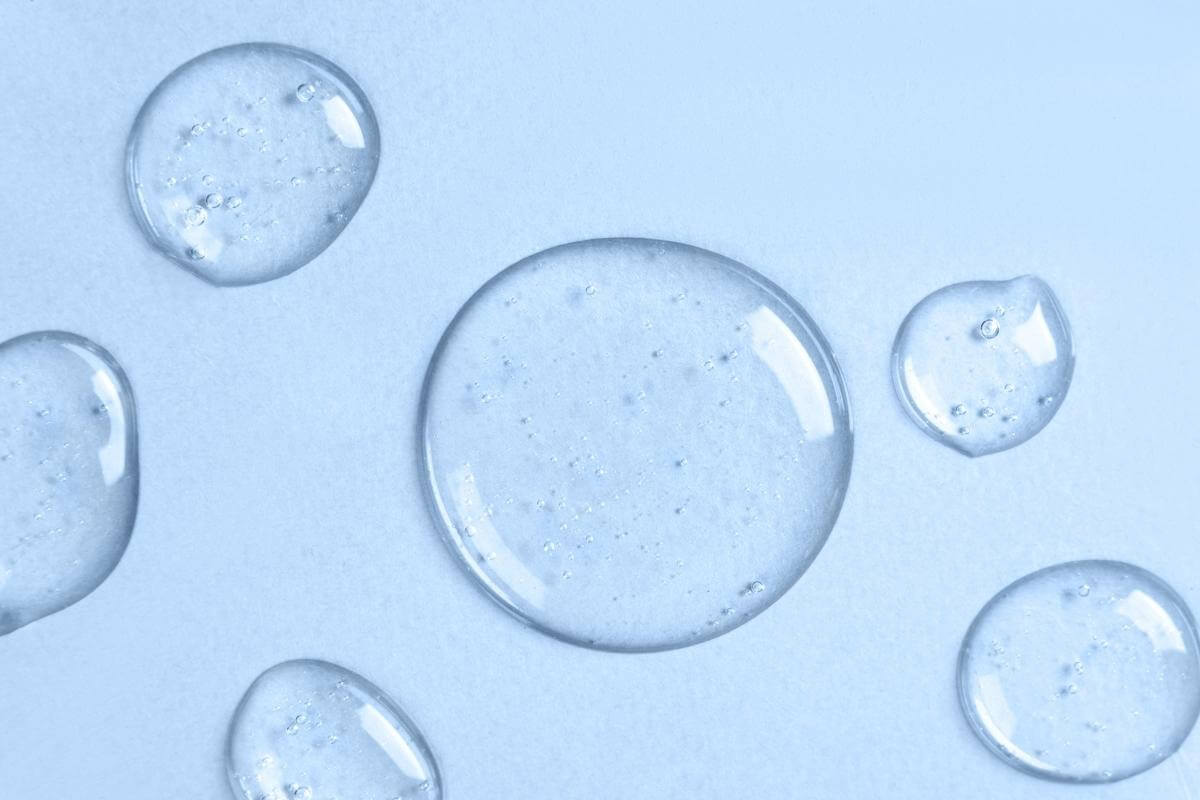
By drawing out every last speck of residual keratin and its residues from the hair’s surface, you’ll notice that your styling products, moisturizers, and hair masks are suddenly 10X more effective at boosting moisture levels in your hair. That’s because ACV’s deep-cleansing detoxifying effects make the hair cuticles more receptive, so the hair responds well.
To juice things up nicely, apple cider vinegar also contains malic acid – a natural humectant that attracts and retains moisture. This can be highly beneficial for people with highly porous hair that struggles to stay hydrated.
ACV Rebalances the pH of Hair and Scalp
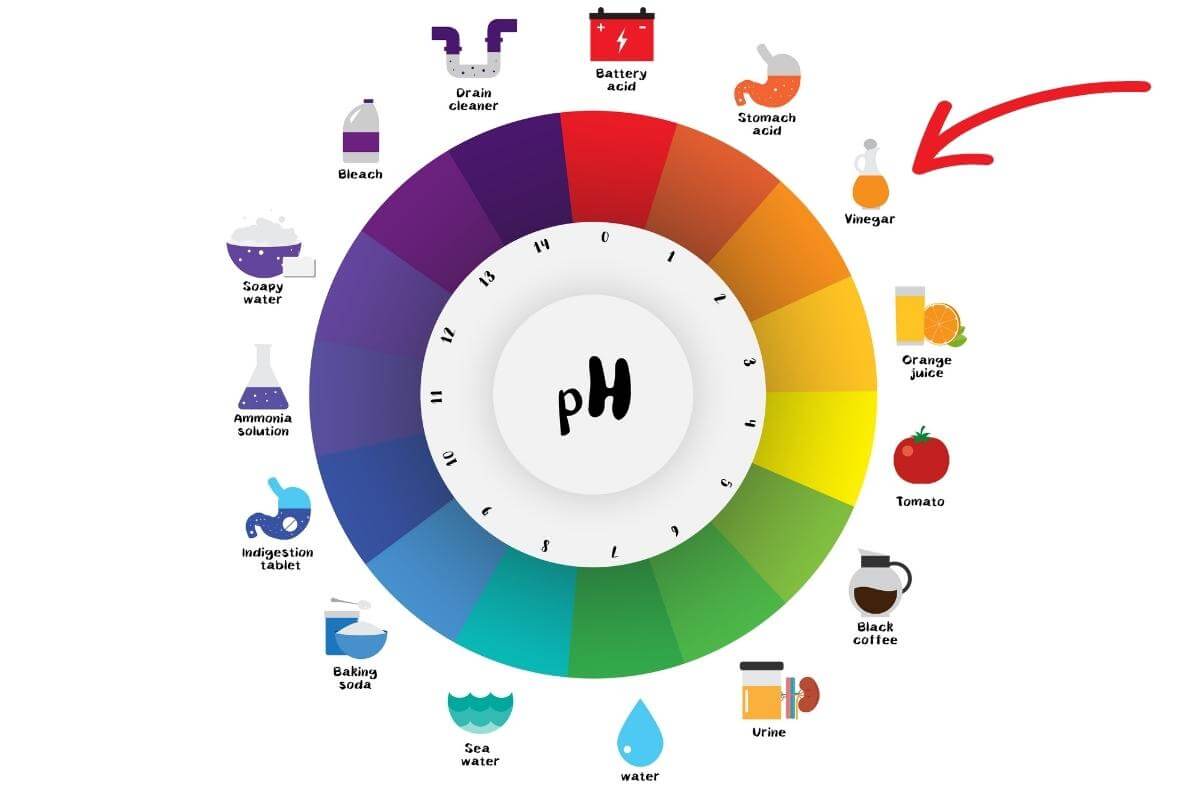
“The normal pH of the scalp is 5.5, and the hair shaft is 3.5. Alkaline shampoo and conditioner disrupt the hair’s pH balance, causing more hair porosity and frizz.” – says Yoram Harth, MD., a Board-Certified Dermatologist.
Everyday hair products like sprays, shampoos, conditioners, and even the water you use to wash your hair can raise the pH of the hair and scalp. The alkalinity of external influences can affect the bacterial flora on the scalp, causing problems like dandruff. High pH also swells the cuticle layer of the hair strands, which can lead to frizz, split ends, and breakage if not restored to its optimal range.
Healthy hair should have a pH ranging of 3.5 – 5.5, which is close to apple cider vinegar’s range of 2-3. When you use ACV as a rinse or within a formulated product, it nudges the hair and scalp towards the acid end of the spectrum. This helps keep the cuticles closed and the scalp acidic to prevent the growth of bad bacteria like fungus.
Best Apple Cider Vinegar to Use
There are two types of apple cider vinegar that you’ll find on the market, filtered and unfiltered. Here’s a brief comparison between the two.
Filtered vs. Unfiltered Apple Cider VinegarApple cider vinegar is made from fermented apple juice. It is a byproduct consisting of sediment of bacteria and yeast that’s also known as “the mother”.
You’ll only find “the mother” in unfiltered vinegar and you can identify it by the cloudiness at the bottle’s bottom.
Filtered vinegar is pasteurized, which means it loses many of its essential nutrients in the process.
Unfiltered ACV, on the other hand, is raw and rich in nutrients.
So always choose the latter and look for “the mother” on the bottle.
Here’s an excellent unfiltered apple cider vinegar I highly recommend:
Bragg's Organic Apple Cider Vinegar With the Mother
How to Use ACV as a Hair Rinse
Here are the step-by-step instructions on how to use apple cider vinegar to reverse protein overload:
- Wash your hair with a shampoo first.
- Mix 2-3 tablespoons of apple vinegar with 16 ounces of water in a spray bottle.
- Spray the mix onto your scalp and leave it for five minutes.
- Wash your hair with cool water.
Before moving on to the next section, you should know that washing your hair with cool water is essential to seal the cuticles and prevent frizz.
You may use up to 4 tablespoons of ACV if you have oily hair.
R+Co Acid Wash Apple Cider Vinegar Cleansing Rinse
How to Use Apple Cider Vinegar to Treat Protein Overload
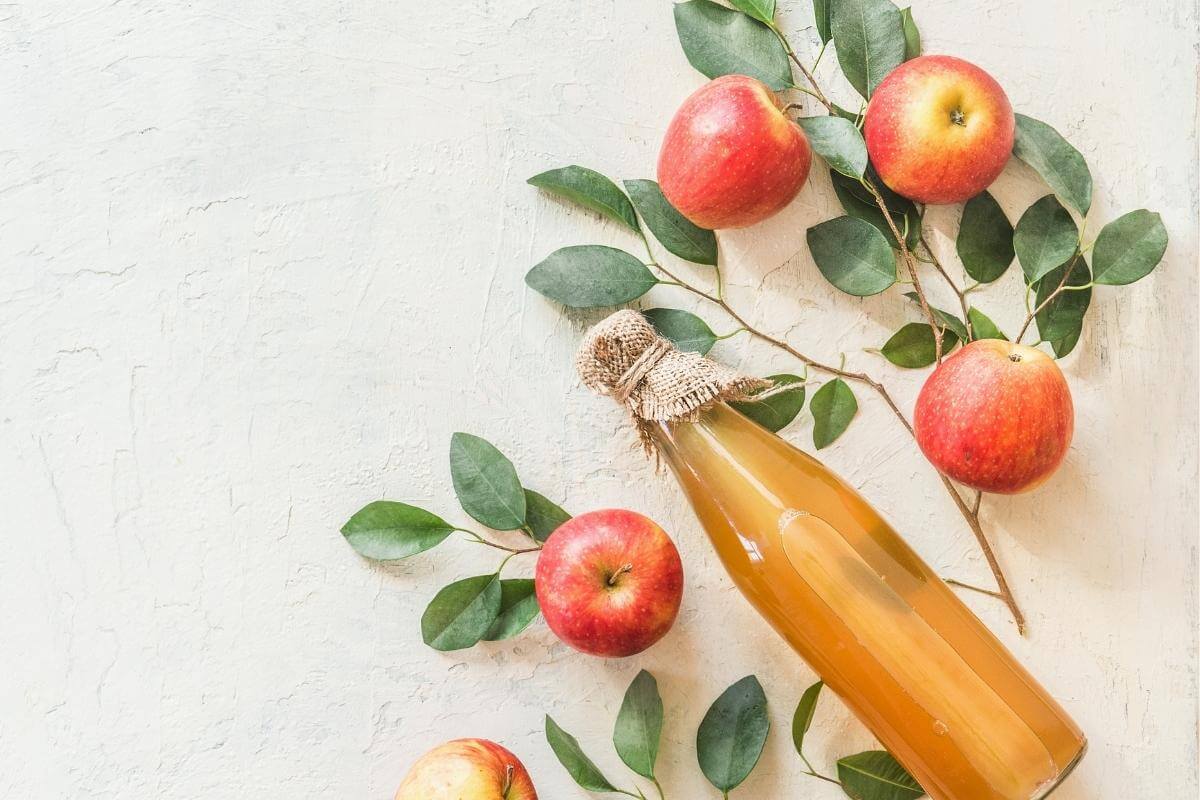
Using ACV on hair isn’t all pink. Some adverse effects might come your way if you aren’t careful while using it.
Here are the precautions to keep in mind when using ACV:
Dilute It Properly
The high acidity of ACV won’t directly damage your hair. However, it may cause irritation if you have a sensitive scalp. Using vinegar without diluting it in water may cause redness and swelling. And in some severe cases, it may cause chemical burns.
“Pure apple cider vinegar is acidic, so make sure you properly dilute it; otherwise, it can make your hair dry and more prone to breaking.” – says Simone Thomas, a hair loss consultant.
This is especially true if you leave the mixture on your head for more than a few minutes. So use the right amount of water, and wash your hair precisely five minutes after you apply the vinegar.
Check Your Scalp Health
Many scalp issues can leave your skin more sensitive, so even diluted vinegar can irritate your head. If you have a history of scalp issues or hair loss issues, you should consult a dermatologist before using ACV on your skin.
Avoid Contact With Your Eyes
Do you know when shampoo gets into your eyes while showering, and you spend a few seconds in agony till it rinses out? Getting ACV inside your eyes will feel the same, only a hundred times worse.
The acid in vinegar can irritate your eyes and cause redness for a few days. In some severe cases, it can cause corneal damage. So under no circumstances should you let vinegar come near your eyes. If it happens, rinse it immediately and contact a doctor if it still hurts after a while.
Perform a Patch Test First
Apple cider vinegar has a few components you might be allergic to, like malic acid. So you should test it on a small area before pouring the vinegar over your scalp.
Apply it to a small area, and wait for a few minutes. If you feel any burn or itching, rinse it immediately and avoid using it again. If you don’t, you can go ahead and apply it to the rest of your hair.
Use It Once a Week
Overusing ACV has the same effects as having too much protein on your scalp. The acid strips your hair shaft of its natural oils, causing dryness and frizz.
I recommend rinsing your hair with vinegar once a week, twice if you have a case of more severe protein overload. However, please note: Everyone’s hair and scalp may react differently. So do a patch test, start small, or add a small amount to your shampoo.
Don’t Use ACV Hair Products With a Homemade Rinse
Your hair’s current condition might compel you to go out of your way to fix it. For instance, you might use ACV hair products after rinsing your hair with the homemade vinegar and water mix. But this is even worse than improperly applied protein treatments.
By using ACV hair products and homemade rinses, you’ll be exposing your skin to too much acid. Doing so won’t give you quicker results or healthier hair.
Instead, it’ll make your scalp too acidic.
Moisturize Your Hair
For perfect results, you should use hydrating products like a moisturizing leave-in conditioner, for example, after rinsing your hair with ACV.
Since it’s an acid, it might wash away all of your hair’s oils, leaving your strands a bit dry. This is especially common for people who often use vinegar to treat dandruff. So don’t forget to slip a moisturizing cream into your hair care routine.
How Long Will It Take for ACV to Fix Protein Overload?
Protein treatments that go wrong aren’t easy to fix, so don’t be disappointed if you don’t see the effects of ACV right away.
Generally, it should take 4-6 weeks to feel the difference. This is in case you rinse your hair with vinegar once a week. If you do it less, you might wait longer before you can flaunt your healthy locks.
Having said that, it might take your hair longer to return to its healthy state if you have protein-sensitive hair. This is because protein-sensitive hair tends to be slightly allergic to proteins, and people who have it should use protein-free products.
If protein treatments leave your hair stiff instead of soft and shiny, even if you don’t apply too much protein, your hair might be extra sensitive.
If You Don’t Like DIY, Get a Formulated Product
If DIY treatments are not your cup of tea and you’re unsure how much to dilute, it’s best to avoid the risk and get a properly formulated hair product. Brands like WOW, Aveeno, and R+CO have excellent acv products that can fix protein overload and restore the hair’s pH balance and moisture.
Check them out:
We may earn a commission from the links below.
How to Avoid Protein Overload in the Future
Here are some helpful tips to help prevent protein overload in your hair in the future:
Add a clarifying shampoo to your hair care routine.A clarifying shampoo deep cleanses and detoxes both the hair and scalp. Using it weekly prevents the accumulation of styling products and enhances the hair’s ability to absorb moisture. So if you’re using protein-heavy treatments, it’s essential to clarify weekly to eliminate the protein byproducts that stay on top of the hairs.
Recommended: Best clarifying shampoos. Have a good mix of moisture and protein products.Most people with low porosity hair tend to overdo it with protein treatments. While more protein is good in such cases, you shouldn’t overlook the importance of balancing your treatments with enough moisture.
tl;dr
Within the hair shaft, protein and moisture work synergistically to create a balance of elasticity, strength, and optimal growth. The hair suffers when there is a deficiency or excess in any one of them.
A moisture overload becomes a protein deficiency. Therefore, it needs to be fixed with a protein treatment.
A protein overload, on the other hand, becomes a moisture deficiency plus excess buildup. To fix it, you need a treatment that works internally and externally.
Apple cider vinegar does just that.
It gently exfoliates the surface and rebalances the hair’s internal moisture and pH. The only downside is you may smell like pickles for a few days. But the smell does dissipate if you allow plenty of ventilation.
References & Citations
- Dual Effects of Alpha-Hydroxy Acids on the Skin.
Tang S-C, Yang J-H. Dual effects of alpha-hydroxy acids on the skin. Molecules. 2018;23(4):863.
Retrieved on 24 sept 2022.
https://www.mdpi.com/1420-3049/23/4/863/htm - pH of Apple Cider Vinegar.
Retrieved on 24 sept 2022.
https://www.healthline.com/nutrition/vinegar-acid-or-base - Skin Hyperkeratosis.
Kempers, S et al. “An evaluation of the effect of an alpha hydroxy acid-blend skin cream in the cosmetic improvement of symptoms of moderate to severe xerosis, epidermolytic hyperkeratosis, and ichthyosis.” Cutis vol. 61,6 (1998): 347-50.
Retrieved on 24 sept 2022.https://pubmed.ncbi.nlm.nih.gov/9640557/ - A Narrative Review on the Role of Acids, Steroids, and Kinase Inhibitors in the Treatment of Keratosis Pilaris.
Reddy S, Brahmbhatt H (October 20, 2021) A Narrative Review on the Role of Acids, Steroids, and Kinase Inhibitors in the Treatment of Keratosis Pilaris. Cureus 13(10): e18917. doi:10.7759/cureus.18917.
Retrieved on 24 sept 2022.
https://www.cureus.com/articles/72862-a-narrative-review-on-the-role-of-acids-steroids-and-kinase-inhibitors-in-the-treatment-of-keratosis-pilaris
About the Author
 Editorial Team
Editorial Team Articles researched, written, and edited in collaboration by Salon-Worthy Hair team members.





